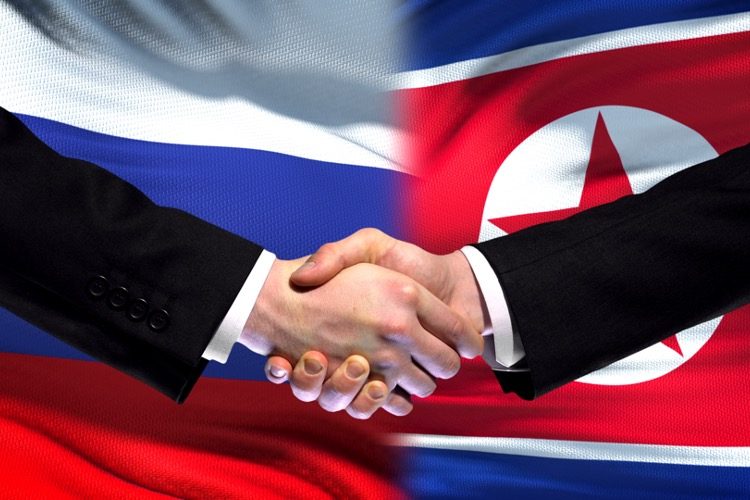
North Korea has shipped containers that could hold millions of artillery shells to Russia, a top South Korean official said, permitting President Vladimir Putin to continue his assault on Ukraine as Kyiv’s stocks of ammunition drop.
South Korean Defense Minister Shin Won-sik told reporters that North Korea is estimated to have deployed about 6,700 containers to Russia, expediting the pace of shipments since Putin held a summit with Kim Jong-un in September 2023, Yonhap News reported on February 27.
The containers could hold about three million rounds of 152mm shells, Shin said.
Russia, in exchange, is supplying North Korea with food, raw materials, and parts used in weapons manufacturing, he added.
The food aid has helped Kim stabilize prices for necessities, Shin said, adding if the arms transfers grow, Russia is set to send more military technology to Kim, which could raise Pyongyang’s ability to destabilize the region.
As North Korea-Russia trade picks up momentum with the Russia-Ukrainian conflict now entering its third year, the flow of the U.S. military aid to Kyiv has been increasingly under threat.
Besides, the EU has sent only about 30 percent of the one million artillery shells it pledged to give Kyiv by March, Ukrainian leader Volodymyr Zelensky bemoaned this week.
The Ukrainian leader said his country believes North Korea has transferred 1.5 million artillery shells to Russia and an unknown number of missiles, adding that Pyongyang is expected to continue providing weapons.
While North Korea and Russia deny any arms transfers, imagery from commercial satellites has revealed about four cargo vessels shuttling between North Korea’s Najin port near the Russian border and the Russian port of Dunai, a former Soviet submarine port about 180km away.
The White House said it has tracked some of those shipments as they traveled by rail across Russia to be stored in depots in Russia near Ukraine.
Cold War partners Russia and North Korea have forged a new partnership since the Kremlin’s full-scale invasion, built upon Pyongyang holding some of the world’s largest stocks of munitions that are interoperable with the weapons Moscow has deployed to the battlefield in Ukraine.
Pyongyang’s transfer of ballistic missiles, artillery shells, and other military equipment to sustain Putin’s military actions in Ukraine is also denting an economy long isolated by international sanctions.
This will allow Kim to shun engagement with the United States for years to come, while at the same time allegedly enhancing his ability to deploy spy satellites and develop his nuclear arms program.
North Korea’s yearly economy is about US$25 billion, based on estimates from South Korea’s central bank, and the country is in dire need of food, oil, building materials, and hard cash for international commerce.
The weapons Kim is providing Russia are likely worth several billion dollars, and the support he is receiving from Putin likely represents some of the biggest gains Kim has seen since he assumed power about a dozen years ago.
In turn, Putin has shown his appreciation, giving the North Korean leader a new Russian-made car.
The vehicle was an Aurus limousine, similar to the one Putin showed Kim when they met in September in Russia for a trip that deepened their military cooperation. The cooperation between Pyongyang and Moscow will be in line with the spirit of the UN Charter and other international laws, it added.
After taking over from Boris Yeltsin in 1999, Putin visited Pyongyang in July 2000 for a meeting with Kim Jong-il, the father of Kim Jong-un.
The Russian President accepted Kim’s invitation when they met in Russia for a summit in September 2023, Peskov said previously.
Kim and Putin’s growing ties in recent years have worried the United States and its allies, which have condemned arms trade between the two countries as a violation of multiple UN Security Council resolutions.
Pyongyang’s transfer of ballistic missiles and other weapons to Russia for use against Ukraine, and its continued development of nuclear and ballistic missile programs demand attention and coordinated action, Dr. Jung Pak, U.S. senior official for North Korea, said at a meeting with the nuclear envoys of South Korea and Japan in Seoul on January 18.
“A more powerful North Korea that will be even more emboldened” may come out of the North Korea-Russia cooperation, warned retired U.S. National Intelligence Council officer Sydney Seiler, who is now senior advisor and Korea chair at the Center for Strategic and International Studies (CSIS).
Speaking at an online CSIS forum on January 11, Seiler warned that the possibility of Russia helping North Korea to boost its production facilities — including technological enhancements — for weapons and equipment ranging from missiles to armored vehicles would be “the most troubling development” from the growing ties.
Kim has increased his bellicosity in recent weeks, from the firing of hundreds of artillery shells near the inter-Korean maritime border from January 5 to 7, to describing South Korea as the “principal enemy” and making references to “war” and “annihilating” the South last week.
At a key parliamentary meeting on January 15, Kim also called for defining South Korea as the “No. 1 hostile country” in the Constitution and to codify the commitment to “completely occupy” the South in the event of war.
North Korean state media, the Korean Central News Agency, said the January 14 intermediate-range ballistic missile (IRBM) test was just a part of “regular activities for developing powerful weapon systems.”
However, Professor Leif-Eric Easley from Ewha Womans University in Seoul said, “This launch is more than just a test as it comes immediately after the Kim regime escalated war-like rhetoric towards South Korea and just before North Korea’s foreign minister travels to Russia. Pyongyang’s show of force should be of concern beyond Seoul, as its military cooperation with Moscow adds to the violence in Ukraine, and because it may be more willing to challenge the United States and its allies while global attention is fixed on the Middle East.”



